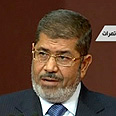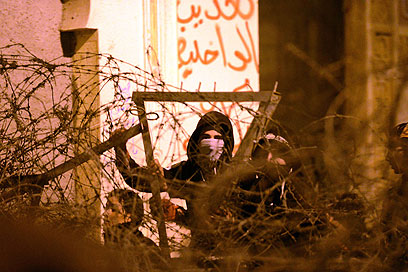
Egyptian President Mohamed Morsi invited opposition parties to a meeting on Monday to discuss concerns about upcoming parliamentary elections, which some parties have threatened to boycott, and agree on ways to ensure their fairness.
The invitation was similar to offers Morsi has made previously that were spurned, and the National Salvation Front opposition coalition immediately rejected the offer to meet.
Related stories:
- Egypt opposition attacks Morsi on elections
- Egypt protest group signs Morsi up to go to space
- Egypt's Brotherhood still operates secretively
"I tell everyone of all colors of the spectrum, to all dear brothers in different parties across Egypt, I approach them by name, by party, by persons to sit tomorrow and put down guarantees for transparent and fair elections," Morsi said in a recorded appearance on a television talk program on Mehwar channel aired late on Sunday.
Morsi also sought to dispel speculation that there were growing tensions between the army and the presidency. Some Egyptians, frustrated with what they view as Morsi's poor performance over the past seven months, have called for the military again to run Egypt.

Anti-Morsi protest (Photo: Reuters)
Egypt's military has been a central force in politics since army officers staged an overthrow of the monarchy in 1952.
"There could never be disagreement between the armed forces and the presidency because the president and the armed forces are not two factions, they are one, and the Supreme Council of the Armed Forces is extremely professional," Morsi said on the show.
In addition, Morsi said he has a strong relationship with the intelligence apparatus.
"The General Intelligence is directly subject to the presidency of the republic, subject to me...I support, trust, protect and love them, and wish them well because through them Egypt's security is protected internally and externally," he said.
Transition to democracy
Morsi said the elections could conclude Egypt's turbulent transition to democracy, which began two years ago with the overthrow of autocrat Hosni Mubarak by popular protests.
Various opposition groups have said they would boycott the legislative elections, a move that could delegitimize the electoral process, which is due to take place in four stages and culminate with the sitting of the new lower house of parliament in July.
The opposition has said that by deciding to hold elections Morsi and his Muslim Brotherhood movement trivialized the deaths of around 60 people in anti-government protests since January and was only concerned with securing parliamentary seats.
The National Salvation Front (NSF), which groups a number of parties opposed to the Islamists, is due to decide in the coming week whether to join the boycott as a movement. But it immediately rebuffed Morsi's call for a dialogue on elections.
"It makes me angry. You take the decision (to hold elections) and then say, 'Come to talk to me'," Khaled Dawoud, an NSF spokesman, said.
- Receive Ynetnews updates
directly to your desktop















